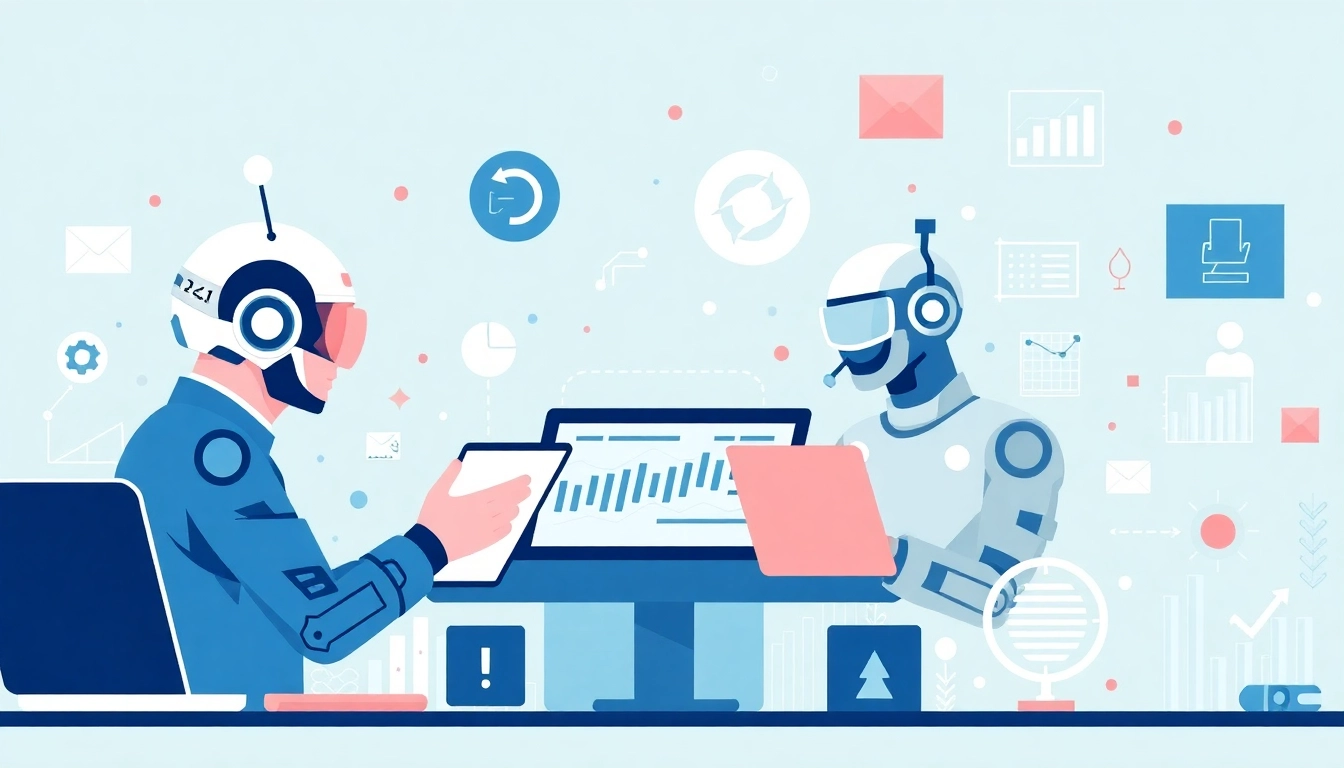Understanding AI Marketing Agents
In today’s digital landscape, the role of artificial intelligence has transformed marketing practices. One of the most significant advancements in this area is the emergence of AI marketing agents, software tools that automate specific marketing tasks using artificial intelligence. As businesses strive for efficiency and effectiveness in their marketing strategies, these agents provide a versatile solution that enhances various facets of marketing, from customer segmentation to personalized content delivery. In this article, we will delve into the complexities of AI marketing agents, exploring their technology, benefits, challenges, and future trends that can shape the marketing landscape.
What are AI Marketing Agents?
AI marketing agents are sophisticated software applications designed to perform marketing tasks by utilizing machine learning and other AI technologies. They operate semi-autonomously, which means they can execute tasks like analyzing data, optimizing campaigns, and personalizing user experiences with minimal human intervention. Unlike traditional marketing tools that rely heavily on human input, AI marketing agents analyze data patterns and consumer behavior to make informed decisions in real-time.
These agents can handle tasks such as lead scoring, content generation, performance tracking, and customer segmentation. As a result, they free up valuable time for marketers, enabling them to focus on strategic decision-making and creative initiatives. According to a report from Statista, the AI market in marketing was valued at approximately $15.84 billion in 2021, with expectations to soar past $107.5 billion by 2028, indicating the growing reliance on AI technologies in marketing.
The Technology Behind AI Marketing Agents
The core technology behind AI marketing agents involves several advanced components of artificial intelligence, including machine learning, natural language processing (NLP), and data analytics. Machine learning algorithms analyze vast datasets to identify patterns and trends that inform marketing strategies. For example, they can predict customer behavior, enabling marketers to tailor campaigns effectively.
Natural language processing allows AI agents to understand and process human language, which is crucial when generating content or engaging in customer interactions, such as with chatbots. Furthermore, data analytics empowers these agents to derive actionable insights from customer data, helping businesses target their marketing efforts more precisely.
Benefits of Implementing AI Agents in Marketing
The advantages of integrating AI marketing agents into business strategies are manifold. First and foremost, they enhance efficiency. Tasks that once consumed substantial time can now be completed in a fraction of the time, thanks to automation. This leads to faster campaign rollouts and reduced operational costs.
Moreover, AI marketing agents can provide data-driven insights that enable marketers to make informed decisions. For instance, they can analyze consumer behavior and preferences, helping brands to craft personalized experiences that resonate with their audiences. Research indicates that personalized marketing can significantly increase engagement rates and conversion potential.
Another compelling benefit is the ability to improve customer relationships. By leveraging AI agents, companies can offer 24/7 customer support through chatbots, enhancing user experience and satisfaction. Additionally, they can predict customer needs and preferences, fostering brand loyalty.
Key Features of Effective AI Marketing Agents
Automation and Efficiency
Automation is one of the defining features of AI marketing agents. They help streamline repetitive tasks such as email marketing, social media management, and data analysis. For instance, platforms like HubSpot seamlessly integrate AI to automate marketing workflows, allowing for quick adjustments based on performance metrics. This efficiency not only saves time but also minimizes the chances of human error, making campaigns more reliable and effective.
Furthermore, automation empowers marketing teams to scale their efforts without corresponding increases in workload. Organizations can manage larger datasets and customer interactions, facilitating hyper-targeted marketing campaigns that optimize resource allocation.
Data-Driven Insights
In the age of big data, the ability to harness insights from information is crucial for competitive advantage. AI marketing agents utilize data analytics to interpret large volumes of data, drawing connections and insights that would be impossible for human analysts to achieve within similar timeframes. Through advanced predictive analytics, AI can forecast trends and customer behavior, allowing businesses to strategize accordingly.
Tools like Google Analytics and Kissmetrics employ AI to provide marketers with comprehensive reports and dashboards. These analytics illuminate which campaigns are performing well, how customers interact with content, and predict future engagement levels, enabling real-time adjustments to optimize performance.
Personalization in Marketing Campaigns
Personalization is no longer optional in marketing; it’s a necessity. Modern consumers expect experiences tailored to their preferences, and AI marketing agents excel in delivering personalized content at scale. By gathering and analyzing customer data, these agents can create highly targeted messages that resonate with individual users.
A great example of this is Netflix, which uses recommendation algorithms to suggest shows and movies based on user viewing behaviors. By analyzing past interactions and preferences, Netflix successfully increases viewer engagement and retention. Similarly, businesses can leverage AI to deliver personalized email recommendations, create customized landing pages, and segment audiences more effectively.
Challenges in Adopting AI Marketing Agents
Integration with Existing Systems
While the benefits of AI marketing agents are compelling, organizations often face challenges during adoption. One of the primary hurdles is integrating these tools with existing systems. Many businesses utilize various software solutions that need to work in tandem with new AI technologies. Ensuring seamless integration often requires significant time and financial investment.
Businesses must assess their current tech stack and identify potential compatibility issues. A phased implementation approach, where AI agents are gradually introduced alongside existing systems, can mitigate these challenges. This strategy allows for extensive testing and optimization before full-scale deployment.
Maintaining Human Oversight
Another critical challenge revolves around maintaining human oversight. Despite significant advancements in AI, human input remains essential in ensuring the success of marketing initiatives. AI agents, while powerful, are not infallible. They require oversight to guide their actions, maintain brand voice consistency, and adhere to ethical standards.
Establishing a framework that includes regular reviews and audits can help ensure that AI marketing agents align with overarching business objectives and values. Training experienced staff to oversee AI agent operations will allow for an effective balance between machine efficiency and human creativity.
Addressing Customer Concerns
As AI increasingly influences marketing strategies, customer concerns regarding privacy and data security come to the forefront. Consumers are wary of how their data is collected, used, and stored. Addressing these concerns is paramount for maintaining trust and loyalty.
Organizations must be transparent about their data practices and ensure compliance with regulations such as GDPR. Implementing robust security measures and being forthcoming about how AI contributes to personalized experiences will foster consumer confidence. Additionally, providing options for customers to opt out of data collection or to edit their preferences can strengthen trust.
Future Trends in AI Marketing
The Role of Machine Learning
Looking ahead, machine learning will continue to play a pivotal role in the evolution of AI marketing agents. Machine learning algorithms will become even more sophisticated, enabling better predictions and insights. As these algorithms improve, businesses will harness AI to analyze complex datasets, reveal deeper insights, and automate more nuanced tasks like campaign segmentation and targeting.
The trend of hyper-personalization, driven by machine learning, will shape customer interactions. By continuously learning from user behavior, AI tools will deliver increasingly tailored experiences, significantly impacting customer satisfaction and company sales.
Environmental and Ethical Considerations
As businesses adopt AI marketing agents, an increasing focus on environmental sustainability and ethical considerations will emerge. The environmental impact of digital marketing practices and AI technologies must be assessed to promote responsible resource usage.
Furthermore, ethical marketing practices will gain importance as consumers demand accountability. Companies will need to be vigilant about how they utilize data and ensure their AI systems are functioning without bias. Establishing ethical guidelines for AI use in marketing will be crucial for fostering consumer trust and sustaining brand reputation.
Predictions for the Next Decade
The next decade holds exciting potential for AI marketing agents. As advancements in AI technology continue at a rapid pace, businesses will leverage these tools to gain a competitive advantage. Predictions indicate that AI will increasingly become a staple component of marketing strategies, transitioning from a novelty to a necessity for successful organizations.
As AI becomes more integrated into everyday marketing functions, we can anticipate a shift toward real-time analytics, allowing brands to adjust strategies instantly. The push for personalization will lead to richer, multi-channel experiences, ensuring engagement at every touchpoint. Organizations that adapt quickly to these shifts will be better positioned to thrive in the evolving marketplace.
Getting Started with AI Marketing Agents
Choosing the Right Tools and Platforms
Choosing the right AI marketing tools and platforms is critical for ensuring effective implementation. Businesses should thoroughly evaluate their marketing needs and objectives before selecting AI software. This includes considering the size of the organization, target audience, and specific marketing goals.
Popular platforms like Salesforce, HubSpot, and Adobe Experience Cloud offer a range of AI functionalities. Businesses must explore various options, focusing on how well each tool integrates with their current systems and scalability potential.
Steps to Integrate AI into Your Marketing Strategy
Integrating AI into marketing strategies requires a structured approach. Organizations should begin by defining clear objectives for AI implementation. These objectives could be enhancing marketing efficiency, improving customer engagement, or optimizing campaigns through data-driven insights.
After defining goals, businesses should conduct a thorough analysis of their existing marketing operations to identify the most suitable areas for AI integration. Once identified, teams can develop a phased rollout plan that includes training staff on using AI tools effectively and monitoring performance metrics to assess success.
Measuring Success and ROI
Measuring the success of AI marketing agents is essential for understanding their impact on overall marketing effectiveness. Key performance indicators (KPIs) such as conversion rates, customer engagement, and return on investment (ROI) should be established to assess performance.
Businesses should continuously monitor these metrics to gauge the effectiveness of their AI marketing initiatives. Regular evaluations will help identify successes and areas for improvement, allowing organizations to fine-tune their strategies for optimal performance.














Leave a Reply